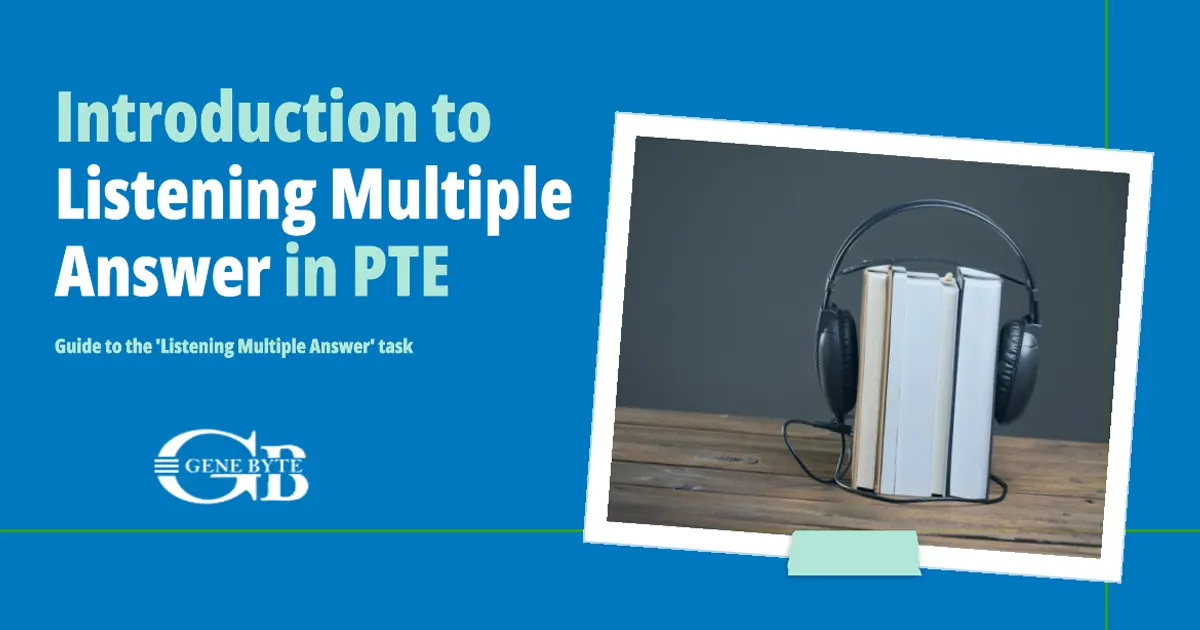Discussing PTE Listening's Multiple-choice, Choose Multiple Answer: An Essential Guide for Teachers
Unlocking the PTE Listening's Multiple-choice, Choose Multiple Answer Task in PTE Academic for Educators

"Mastering PTE Academic's Multiple-choice, Choose Multiple Answer (Listening) isn't just about hearing, it's about understanding the subtleties of academic discourse and making informed choices. It's a skill that extends beyond the test, preparing you for real-world academic and professional challenges."
The Multiple-choice, Choose Multiple Answer task in the Listening Section of PTE Academic challenges students to comprehend complex academic content and discern subtleties within spoken English. It combines keen listening with strategic thinking. At Genebyte, we transform this challenge into an opportunity for coaching institutes through our advanced AI-driven platform, equipping educators with the tools to guide their students toward mastery in this crucial task.
Key Takeaways:
- Task Requirements: Students analyze, interpret, and evaluate complex audio recordings, identifying multiple correct answers from a set of options, often including paraphrased content or potential distractors.
- Skills Assessed: This task evaluates listening comprehension, attention to detail, and critical thinking.
- Effective Strategies: Understanding the task helps educators develop teaching methods tailored to its requirements.
- Empowering Educators: Genebyte's AI-powered solutions enhance coaching methods, providing tools and methodologies to tackle the nuances of this task.
This discussion highlights the significance of the Multiple-choice, Choose Multiple Answer task, and demonstrates how Genebyte's innovative approach can enhance preparation strategies, ensuring students are well-equipped for both test-taking and real-world academic scenarios. By focusing on this aspect of the PTE Academic Listening, we aim to improve students' performance and elevate the overall quality of English language teaching and proficiency.

Introduction to PTE Academic's Multiple-choice, Choose Multiple Answer (Listening)
Overview of the Task
In the PTE Academic exam, the Multiple-choice, Choose Multiple Answer (Listening) section offers a unique and challenging component. Here, test-takers are required to listen attentively to a recording, which typically ranges between 40 and 90 seconds in length. Following the audio, they are presented with a multiple-choice question regarding the content or tone of the recording.
This task is not just about passive listening. It demands active engagement and a critical ear, as students must select more than one correct answer from the given options. This feature sets it apart from standard single-answer questions and adds a layer of complexity, as candidates must be adept at identifying multiple correct responses that are often subtly phrased or nuanced.
Length of Question Audio
The audio length for each question varies, falling between 40 to 90 seconds. This variability requires students to be adaptable and maintain a high level of concentration regardless of the length of the recording. Shorter recordings do not necessarily imply simplicity, and longer ones require sustained attention and memory recall.
Skills Assessed: Listening
At its core, this section assesses a crucial skill - listening. But it goes beyond basic comprehension. Students must demonstrate their ability to discern key points, understand the overall tone, and distinguish between similar-sounding options. This skill is vital not only for exam success but also for real-world academic and professional environments where effective listening can be critical.
Significance in PTE Academic
The Multiple-choice, Choose Multiple Answer (Listening) section plays a significant role in evaluating a candidate's listening proficiency within the PTE Academic framework. It tests a range of abilities from understanding the gist of the audio to picking up specific details and nuances. This makes it a comprehensive measure of a student's listening skills, an essential component for academic success in English-speaking environments.

Structure and Format of the Listening Task
Nature of Multiple-choice Questions
The Multiple-choice, Choose Multiple Answer task comes after the Summarize Spoken Text task, here test-takers are presented with a recording, followed by a question that demands the selection of multiple correct answers from several options provided. This task is designed to assess the ability to discern and evaluate the audio content critically, requiring a nuanced understanding of both the question and the choices available.
Selecting Multiple Correct Answers
-
Strategies for Identifying Key Information:
- Note-taking: It's essential to jot down main points and supporting details during the brief period before the recording starts and while listening. This approach aids in organizing thoughts and correlating them with the answer options.
- Order of Information: Often, the sequence of details in the options may not align with the order in the audio. Hence, a systematic approach to note-taking is crucial.
- Selective Attention: Focusing on specific details like times, places, and events ensures a comprehensive understanding of the audio content.
-
Understanding the Complexity of Choosing More Than One Response:
- Meaning Over Words: The key is to choose options that align with the overall meaning of the audio, not just those that share words or phrases. This demands a deep understanding of the content and the ability to interpret the audio beyond its literal terms.
- Avoiding Misleading Options: Some options, while containing words from the recording, might not capture the intended message. Discerning the right answers requires critical analysis and an ability to differentiate between literal and implied meanings.
Possible Negative Marking
- Scoring Dynamics: For each correct response marked, candidates earn a point. However, marking an incorrect option results in a point being deducted. This scoring mechanism adds an additional layer of complexity, encouraging test-takers to make informed choices rather than guesses.
- Minimum Score: The minimum score for this task is zero, meaning that incorrect answers will not result in negative total scores, but can neutralize the points earned from correct answers. This emphasizes the importance of accuracy over quantity in response selection.
- Balancing Risk and Reward: The challenge lies in striking the right balance between being cautious and being assertive in marking the options. Test-takers need to judiciously decide which options to select, weighing the potential gain of a correct choice against the risk of losing points for an incorrect one.
Genebyte's Role in Enhancing Listening Skills
At Genebyte, we understand the intricacies of this task and have developed our AI-driven platform to address these specific challenges. Our technology aids in honing the listening and analytical skills required for this section, making it a valuable tool for coaching institutes aiming to improve their students' performance in PTE Academic.

Challenges Presented by the Task
Analyzing Audio Content
-
Distinguishing between Main Ideas and Supporting Details:
- The PTE Academic Multiple-choice, Choose Multiple Answer (Listening) task requires test-takers to discern main ideas and supporting details within the audio. This requires careful listening and the ability to categorize information effectively.
- Note-taking is an essential skill here. Students should focus on jotting down key points and details during the listening period, as this helps in better understanding and recalling the content when selecting answers.
-
Identifying Tone and Content:
- Understanding the tone and content of the audio is vital. Test-takers must be adept at interpreting the speaker's attitude and the context of the discussion.
- It's crucial to select responses that align with the overall meaning and tone of what was heard, not just because they contain similar words or phrases.
Dealing with Paraphrased Responses and Distracting Sounds
-
Skills to Recognize Paraphrasing:
- One of the significant challenges is the presence of paraphrased responses in the answer options. These require students to have a robust understanding of the language and the ability to identify the essence of what's being said, regardless of how it's phrased.
- Genebyte's platform provides extensive practice in identifying paraphrased content, enhancing students' ability to comprehend and respond accurately to such challenges.
-
Techniques to Avoid Common Traps:
- Avoiding common traps like being misled by similar-sounding words or phrases is essential. Students should be trained to focus on the meaning rather than just the words.
- Genebyte's AI-driven analysis tools help in identifying patterns in student responses, allowing for personalized coaching to overcome these specific challenges.
Negative Marking in Multiple-choice, Choose Multiple Answer
- Scoring Dynamics: Understanding the scoring system is crucial. Correct answers earn points, but incorrect choices lead to a deduction. This scoring method reinforces the importance of accuracy over guesswork.
- Strategic Selection: Students must learn to be strategic in their selections, ensuring they choose options they are confident about. Genebyte's solution provides analytics-driven insights, helping students make more informed choices.
- Minimizing Risks: The platform's adaptive learning modules focus on minimizing the risks associated with negative marking by enhancing students' ability to discern correct answers reliably.
Genebyte's Approach to Addressing These Challenges
Genebyte's AI-powered platform is designed to tackle the unique challenges posed by the Multiple-choice, Choose Multiple Answer (Listening) task in PTE Academic. Our technology not only aids in enhancing listening skills but also focuses on developing critical thinking and decision-making abilities essential for this task. In the following section, we will explore how Genebyte's innovative tools and methodologies specifically cater to the demands of this challenging section of the PTE Academic exam.

Genebyte's Solution for Effective Preparation
Utilizing AI Technology for Enhanced Listening Practice
-
Adaptive Learning Modules Based on Individual Student Needs:
- Genebyte's AI-driven platform offers adaptive learning modules, tailored to address the unique requirements of each student. These modules focus on enhancing listening skills, particularly for the Multiple-choice, Choose Multiple Answer (Listening) section of PTE Academic.
- By analyzing individual performance, the system adapts the difficulty and type of content, ensuring that students are continuously challenged and engaged.
-
Real-time Feedback and Analytics for Continuous Improvement:
- Continuous feedback is crucial for effective learning. Genebyte's platform provides immediate, actionable insights into students' listening skills, helping them understand their strengths and areas for improvement.
- The analytics feature tracks progress over time, offering a clear view of how students are evolving in their listening abilities and where they need to focus more.
-
Offering a Unique Blend of Technology and Educational Expertise:
- Genebyte combines cutting-edge technology with educational expertise to create a comprehensive learning environment. This blend ensures that students are not only practicing with the best tools but are also guided by pedagogical principles that enhance their learning experience.
Impact on Coaching Institutes
-
Increasing Success Rates in PTE Academic Through Targeted Training:
- By using Genebyte's platform, coaching institutes can significantly boost their students' success rates in the PTE Academic exam. The targeted training approach focuses on the specific challenges of the Multiple-choice, Choose Multiple Answer (Listening) section, ensuring that students are well-prepared for this task.
- The ability to customize training according to individual needs means that institutes can offer more personalized and effective coaching.
-
Preparing Students for Diverse Listening Challenges Beyond PTE Academic:
- The skills developed through training for the PTE Academic's listening section are applicable in a variety of real-world scenarios. This prepares students not just for the exam, but for academic and professional environments where effective listening is key.
- Genebyte's solution thus equips students with lifelong skills that go beyond test preparation.
-
Positioning Coaching Institutes as Leaders in PTE Academic Training:
- By integrating Genebyte's advanced platform into their training programs, coaching institutes can position themselves as leaders in PTE Academic preparation.
- This technological edge, combined with effective training methodologies, enhances the institute's reputation and attracts more students seeking high-quality PTE Academic preparation.

Actionable Tips for Mastering Multiple-choice, Choose Multiple Answer (Listening)
- Focused Listening Practices: Use varied audio materials with different accents and speeds to adapt to diverse recordings in PTE Academic.
- Effective Note-taking: Teach efficient note-taking, focusing on key points and details.
- Critical Analysis: Develop skills in analyzing and interpreting audio content, understanding both literal and implied messages.
- Practice with Paraphrased Content: Use practice questions with paraphrased responses to recognize the same idea in different ways.
This section tests listening, analysis, and interpretation skills, requiring critical thinking and strategic decision-making. After this, students move to the Fill in the Blanks task in the Listening section.
Genebyte's Edge in PTE Academic Preparation
Genebyte's B2B SaaS solution is tailored for coaching institutes, offering tools and resources to enhance listening skills, provide real-time feedback, and personalize learning. Partnering with Genebyte ensures students are well-prepared for the PTE Academic and equipped with essential skills for their academic and professional lives.
Elevate your institute's PTE Academic preparation with Genebyte. Discover how our solutions can improve teaching and student outcomes. Visit our website or contact us to learn more. Let's achieve excellence in PTE Academic preparation together.
Frequently Asked Questions
In PTE Listening, this task involves answering a question based on a recording by selecting more than one correct response from the given options. It tests your ability to analyze and interpret academic audio content.
The scoring varies, but typically, each correct response earns a point, and incorrect choices can result in negative marking.
Key guidelines include listening carefully, taking notes, understanding the main and supporting details, and avoiding choices based solely on word matching.
Practice focused listening, develop note-taking skills, understand paraphrasing, and improve your ability to distinguish between main ideas and supporting details.
Critical listening, attention to detail, ability to identify key points, and understanding of tone and content are crucial.
Different types of content, such as lectures or conversations, require varying listening strategies and note-taking approaches.
Challenges include dealing with fast-paced audio, recognizing paraphrased information, and avoiding distractions from irrelevant content.
Understanding paraphrasing is essential as the correct answers often rephrase the audio content rather than repeating it verbatim.
Regular practice with diverse audio materials, active listening exercises, and paraphrasing practice are effective techniques.
Engage in extensive listening practice, familiarize yourself with various accents, and regularly test yourself under exam-like conditions.
This task is important as it significantly contributes to the overall listening score and tests comprehensive listening skills.
Consistently practice with PTE-specific materials, analyze your performance for continuous improvement, and focus on developing a keen ear for academic content.